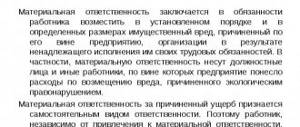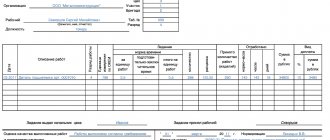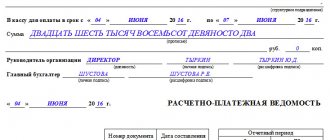Home / Labor Law / Responsibility / Material
Back
Published: 05/15/2016
Reading time: 7 min
0
2748
The form of financial liability, in which the responsibility for compensating the employer for possible damage is entrusted to the team (team) as a whole, and not to its individual representatives, is called collective or brigade.
In this case, the employer is not able to determine the scope of responsibility of each individual team member and conclude an agreement with him on compensation for losses. In the event of a shortage or any other damage to the employer, the entire group covers the losses .
Team liability is most often used in the following types of activities:
- sale or release of material assets entrusted to the brigade;
- treatment;
- transportation;
- storage.
A complete list of works for which the employer has the right to conclude a collective liability agreement with employees can be found in Decree of the Ministry of Labor of the Russian Federation dated December 31, 2002 No. 85.
The main provisions of collective liability are fixed in the text of Art. 245 TK.
- Features of concluding a contract
- Liability options
- Distribution of responsibilities between team members
- The procedure for imposing material penalties under collective liability
What is KMO?
KMO is a form of loss coverage. The funds are paid to the employer. All members of the work collective bear responsibility for damage. In this case, a specific culprit may not be identified. Collective responsibility is relevant only for those categories of employees who cannot bear personal responsibility.
Within the framework of the KMO, money cannot be recovered from all employees without exception. Penalty does not apply to these employees:
- Those on sick leave.
- Acceptance into the company after inventory, during which damage is addressed.
The main goal of KMO is to ensure careful handling of the company’s property.
Collective MO within the TC
The Labor Code is the main normative act regulating the relationship between employer and employees. It also regulates the operation of the KMO. Let's consider the articles of the Labor Code concerning collective responsibility:
- Article 232. Contains a general definition of KMO.
- Article 233. Contains general principles for determining the occurrence of KMO and the specifics of proving the fact of damage and its amount.
- Article 238. Specifies the general principles of holding persons accountable. The principle here is that employees are only required to cover direct damages. Indirect damage is not compensated. That is, employees are not responsible for lost profits.
- Article 239. Contains a list of conditions that exclude the liability of employees. These conditions also apply to KMO.
- Article 240 Gives the employer the right to refuse collective compensation. The manager can also reduce the amount of compensation.
- Article 242. It contains the concept of full MO, as well as the age limit for involvement in it.
- Article 243. It specifies a list of cases in which full MO occurs.
- Article 244. Contains the rules for concluding agreements on international defense.
- Article 245 Regulates the application of KMO.
- Article 246. It contains the procedure for determining the amount of damage.
- Article 247 Establishes the obligation to determine the cause of damage.
- Article 248 Regulates the procedure for collection.
Almost all articles relating to ordinary financial liability are also applicable to collective MO.
Article TCRF 245. Collective (team) financial liability for damage
Commentary on Article 245
1. Collective (team) financial liability is a type of full financial liability for damage caused to the employer. It arises on the basis of special agreements (see Article 244 of the Labor Code and the commentary thereto).
This responsibility can be introduced in cases of joint performance by employees of certain types of work related to the storage, processing, sale (vacation), transportation, use or other use of the values transferred to them, when it is impossible to delimit the financial responsibility of each employee and conclude an agreement with each on full financial responsibility .
A written agreement on collective (team) financial responsibility is concluded between the employer and all members of the team (team).
2. The list of works during the performance of which full collective (team) financial liability for the shortage of property entrusted to employees can be introduced is determined by Resolution of the Ministry of Labor of Russia of December 31, 2002 N 85 (Appendix 3).
This List is in many ways similar to the List regulating issues of individual full financial liability under a contract. It includes the following works:
— acceptance and payment of all types of payments; for settlements during the sale (sale) of goods, products and services (including not through a cash register, through a cash register, without a cash register through a seller, through a waiter or other person responsible for making payments); servicing vending and cash machines; for the production and storage of all types of tickets, coupons, subscriptions (including subscriptions and coupons for food (food) and other signs (documents) intended for payments for services);
— related to the implementation of: depository activities; examination, authentication and other verification, as well as destruction in the prescribed manner of banknotes, securities issued by a credit or other financial organization and (or) the Ministry of Finance of Russia forms; transactions for the purchase, sale, permission to pay and other forms and types of circulation of banknotes, securities, precious metals, coins made of precious metals and other currency values; cash transactions when servicing ATMs and servicing clients who have individual safes in the vault, recording and storing valuables and other property of clients in the vault; operations for the issue, accounting, storage, issuance and destruction of bank, credit, discount cards, cash and other financial services to customers, for counting, recalculating or generating cash and currency values; collection functions and transportation (transportation) of funds and other valuables;
- for the purchase (reception), sale (trade, release, sale) of services, goods (products), preparing them for sale (trade, release, sale);
- on acceptance for storage, processing (manufacturing), storage, accounting, release (issuance) of material assets in warehouses, bases, storerooms, points, departments, sites, in other organizations and divisions; on equipment of passenger ships, carriages and aircraft; for servicing the residential sector of hotels (campsites, motels, etc.);
- for accepting cultural and household items and other material assets from the population for storage, repair and for performing other operations related to the manufacture, restoration or improvement of the quality of these items (valuables), their storage and other operations with them; for the rental of cultural and household items and other material assets to the population;
— for the reception and processing for delivery (escort) of cargo, luggage, postal items and other material and monetary assets, their delivery (escort), issuance (delivery);
— for the manufacture (assembly, installation, adjustment) and repair of machines and equipment, devices, systems and other products produced for sale to the public, as well as parts and spare parts;
- for the purchase, sale, exchange, transportation, delivery, forwarding, storage, processing and use in the production process of precious and semi-precious metals, stones, synthetic corundum and other materials, as well as products made from them;
— on growing, fattening, keeping and breeding farm and other animals;
— for the production, processing, transportation, storage, accounting and control, sale (purchase, sale, supply) of nuclear materials, radioactive substances and waste, other chemicals, bacteriological materials, weapons, ammunition, components for them, explosives and other products (goods) prohibited or restricted for free circulation.
This List of Positions and Works is not subject to broad interpretation.
3. The employer’s decision to establish full collective (team) financial liability is formalized by order (instruction) of the employer and announced to the team (team). The order (instruction) is attached to the relevant agreement.
The recruitment of a newly created team (team) is carried out on the basis of the principle of voluntariness. When new employees are included in the team (team), the opinion of the team (team) is taken into account.
Management of the team (team) is entrusted to the team leader (foreman), who is appointed by order (instruction) of the employer, issued taking into account the opinion of the team (team).
In the temporary absence of the team leader (foreman), his responsibilities are assigned by the employer to one of the team members (team).
When there is a change in the team leader (foreman) or when more than 50% of its original composition leaves the team (team), the agreement on full collective (team) responsibility must be re-signed. The contract is not renewed if individual workers leave the team (team) or new workers are admitted to the team (team). In these cases, the date of his departure is indicated against the signature of the retired member of the team (team), and the newly hired employee signs an agreement and indicates the date of joining the team (team).
4. The team (team) has the right:
- participate in the acceptance of entrusted property and exercise mutual control over the work of storage, processing, sale (release), transportation or use of entrusted property in the production process;
— take part in inventory, audit, and other verification of the safety of the property entrusted to the team (team);
— get acquainted with reports on the movement and balances of property entrusted to the team (team);
— in necessary cases, require the employer to conduct an inventory of the property entrusted to the team (team);
- inform the employer about the removal of members of the team (team), including the manager, who, in their opinion, cannot ensure the safety of property.
5. The team (team) is obliged to:
- treat the entrusted property with care and take measures to prevent damage;
— keep records, draw up and promptly submit reports on the movement and balances of entrusted property;
- promptly notify the employer of all circumstances that threaten the safety of property.
6. The employer is obliged:
— create for the team (team) the conditions necessary to ensure the complete safety of the property entrusted to it;
— timely take measures to identify and eliminate the reasons that prevent the team (team) from ensuring the safety of property, identify specific persons responsible for causing damage, and hold them accountable;
— familiarize the team (crew) with the legislation on the financial liability of employees for damage caused to the employer, as well as with other regulatory legal acts (including local ones) on the procedure for storage, processing, sale (release), transportation, use in the production process and implementation other transactions with the property transferred to him;
— provide the team (team) with the conditions necessary for timely accounting and reporting on the movement and balances of the property entrusted to it;
— consider the validity of the team’s (team’s) request to conduct an inventory of property;
— consider, in the presence of the employee, the recusal stated to him and, if the recusal is justified, take measures to remove him from the team (team), decide the issue of his further work in accordance with the law;
- consider reports from the team (team) about circumstances that threaten the safety of the property entrusted to it and take measures to eliminate these circumstances.
7. Reception of property, accounting and reporting on the movement of property are carried out by the team leader (foreman). Scheduled inventories of property are carried out within the time limits established by the current rules. Unscheduled inventories are carried out when there is a change in the team leader (foreman), when more than 50% of its members leave the team (team), as well as at the request of one or more members of the team (team). Reports on the movement and balance of property are signed by the team leader (foreman) and, in order of priority, by one of the team members (team).
The contents of the report are announced to all members of the team (team).
8. An agreement on full collective (team) financial liability is drawn up in two copies having equal legal force, one of which is kept by the employer, and the second by the team leader (foreman). The contract is signed by the employer (his competent representative), the team leader (foreman) and all members of the team (team). If an employee refuses to conclude (sign) an agreement on collective (team) financial responsibility, the employer must offer him another job that matches his qualifications. If there is no such work or the employee refuses another job offered, he may be dismissed in the manner prescribed by law.
The contract is valid for the entire period of work of the team (team) with the property entrusted to it. Changes to the terms of the agreement, additions, termination or termination of its validity are carried out by written agreement of the parties.
9. According to the agreement on collective (team) financial responsibility, the latter is assigned to the team as a whole. Since the collective (team) is not an independent economic entity (legal entity) and cannot be the subject of liability, the real debtors under the agreement on full collective (team) financial liability are all members of the collective (team). Labor legislation does not say anything about the possibility of joint liability of members of a team (team), therefore, full recovery of the amount of damage from one of the members of the team (team), for example, from the manager, is possible only with the written consent of the latter. The general rule determining the subject composition of compensation for damage should be the shared form of compensation for damage.
In accordance with the previous legislation, the damage caused by the team (team) to the employer and subject to compensation was distributed among the members of the team (team) in proportion to the monthly tariff rate (official salary) and the actual time worked for the period from the last inventory to the day the damage was discovered.
This principle of compensation for damages may still be partially applied today, but the Code has introduced certain innovations into the system of compensation for damages. So, if an employee (team member) claims to be exempt from financial liability, then he must prove the absence of his guilt. In case of voluntary compensation for damage, the degree of guilt of each member of the team (team) is determined by agreement between all his (her) members. If this does not happen, the degree of guilt of each employee is determined by the court.
10. If a claim for damages is filed on the grounds provided for in Art. 245 of the Labor Code, the court needs to check whether the employer has complied with the rules for establishing collective (team) financial liability provided for by law, and whether a claim has been brought against all members of the team (team) who worked during the period the damage occurred. If the claim is not brought against all members of the team (team), the court, based on Art. 43 of the Code of Civil Procedure, has the right, on its own initiative, to involve them in the case as third parties who do not make independent claims regarding the subject of the dispute, on the side of the defendant, since the correct determination of the individual responsibility of each member of the team (team) depends on this.
When determining the amount of damage to be compensated by each of the workers, the court must take into account the degree of guilt of each member of the team (team), the monthly tariff rate (official salary) of each person, the time that he actually worked as part of the team (team) for the period from the last inventory until the day the damage is discovered (clause 14 of the Resolution of the Plenum of the Supreme Court of the Russian Federation No. 52).
Comments to the Labor Code of the Russian Federation
Publishing House "Gorodets", 2007
Source: SPS Consultant
Functions of collective responsibility
Collective MO is similar to individual MO in many ways. Its only difference is that the damage is recovered from the entire team. A team can be understood as a team, department, or unit that is assigned common tasks. Collective MO has a number of advantages over individual MO. Consider these benefits:
- Each employee of the company begins to treat common property more carefully. Employees have to focus on performing their immediate functions.
- Simplifying the implementation of collective projects. Each employee begins to feel his personal responsibility.
- Simplifying accountability. The employer will not have to waste time searching for the culprit. The procedure for covering damages is greatly simplified.
- Simplification of recovery of large damages. According to the law, only an amount equal to his average salary can be withheld from one employee. With collective liability, the possible amount of recovery increases significantly.
The main advantage of collective MO is the ability not to look for the culprit.
Imposition of a collective financial penalty: algorithm of actions
Despite the existence of an agreement, in order to compensate for the damage, the employer will need to make a lot of effort and act strictly according to the regulations. Any violation of the procedure is fraught with legal action from employees. The algorithm of actions is as follows:
- Management must make sure that damage or loss was the fault of employees and not due to a weak security system.
- According to Article 239 of the Labor Code of the Russian Federation, the employer is obliged to comprehensively study the possibilities of not applying the agreement on liability.
- Authorized persons must collect evidence of the team’s involvement, for example, establish cause-and-effect relationships between the actions of employees and the resulting damage.
As for the collection procedure itself, the employer must comply with all aspects specified in labor legislation and in the agreement itself.
Grounds for involvement in collective IR
KMO is relevant only for organizations operating in certain industries:
- Sales.
- Catering.
- Construction.
- Financial work.
- Work that involves accepting payments.
- Creation and storage of documents.
- Carrying out audits and revisions.
- Mediation in the field of trade.
- Storing any objects.
The conditions for the onset of KMO are stipulated in Article 243 of the Labor Code. In particular, these are the following circumstances:
- Proven shortages, damage to company property during working hours.
- Intentional damage.
- Damage resulting from the disclosure of a trade secret.
- Damage to company employees caused outside of working hours.
KMO is applicable only when the case of damage is proven.
Special cases reflected in the PMO
To limit ourselves to listing positions in the PMO that comply with Resolution No. 85 means not to take into account an important nuance provided for by labor legislation. It concerns situations where full financial liability may arise for those employees with whom DMOs have not been concluded (and their registration is not required by law).
Non-contractual financial liability arises in the following cases (Article 243 of the Labor Code of the Russian Federation):
- Damage to the company's property was caused by the intentional actions of an employee;
- damage, loss and damage to assets occurred as a result of the actions or inaction of an employee who was intoxicated (alcohol, drugs or toxic);
- the company’s property was damaged as a result of the employee’s criminal actions (there is a court verdict) or an administrative offense committed by him, the fact of which was established by a government agency;
- the employee damaged the company's property by using it for personal purposes;
- the company suffered damage as a result of the disclosure by its employee of secret information constituting a secret protected by law.
In such a situation, the employer can additionally insure itself by concluding a non-disclosure agreement with an employee who has access to classified information. It will emphasize the importance of non-disclosure of secret data and formally impose additional responsibility on the employee for its safety.
IMPORTANT! A non-disclosure agreement will not help to recover lost profits from an employee, since the obligation to compensate for damage arises within the framework of labor relations and the rules of Art. 139 of the Civil Code of the Russian Federation on compensation for losses in full for such cases do not apply.
When is a CMO agreement invalid?
An agreement on collective international defense can only be concluded if these conditions are simultaneously met:
- Employees are over 18 years of age.
- The specialty of the employees is included in the list of professions to which the MO is applicable.
If an agreement on KMO is drawn up with employees whose specialty is not included in the list, it is declared invalid. This list was approved by Resolution of the Ministry of Labor No. 85 of December 31, 2002.
The agreement is also invalidated when the employer fails to fulfill its obligations. And its main obligation in this context is to ensure the protection of property. If protection is not provided, the employer's failure to act is considered negligence. In this case, employees do not need to pay damages based on the agreement.
Legality of introduction
The most common KMO in stores. Is this legal? The introduction of collective responsibility is legal if all formalities are met:
- Availability of an organization order.
- Familiarization of employees with the order against signature.
- Conclusion of the CMO agreement.
The sample agreement is specified by a resolution of the relevant body. However, this sample is considered advisory. The manager has the right to make adjustments to it in accordance with his own needs.
If all legal grounds for introducing KMO are present, the employee is required to sign the appropriate agreement. If he does not do this, he may be dismissed on the grounds of failure to perform job functions.
The KMO action begins from the moment the fact of damage is established. The amount to cover the damage is divided equally between all representatives of the team who signed the agreement. Employees may not agree with the manager's decision. In this case, you cannot simply refuse to pay. You need to file a claim in court. Court representatives separately determine the amount of damage. Conflicts concerning KMO are resolved by the World Court or the labor commission.
Distribution of responsibilities between team members
MO is distributed among employees taking into account their tariff rates. These factors are also taken into account:
- Time worked (including sick leave and vacations).
- The degree of guilt of the employee.
The most difficult moment is determining the degree of guilt. Employees can cover damages voluntarily. In this case, MO is usually distributed equally among team members. If employees do not agree with the manager’s decision, the extent of damage is determined by the court. Responsibility is relieved from employees in these cases:
- Definitely definitely the culprit.
- The innocence of the team has been established.
- There was negligence on the part of the employer.
In the presence of these circumstances, employees, except for the guilty person, do not pay anything to the employer.
Documenting
Employees can be involved in collective MO based on the manager’s order and agreement. Let's consider the correct execution of these documents.
Manager's order
The order must record this information:
- Company name.
- Grounds for KMO (Article 245 of the Labor Code).
- Instructions for the introduction of KMO (the instructions must be preceded by the word “I order”).
- Indication of the composition of the team (position, full name).
- Appointment of a team leader (his full name must be indicated).
- Sending instructions to the HR department about the need to conclude a CMO agreement.
- Sending instructions to the chief accountant regarding the development of Property Accounting Rules.
- Signature of the general director.
- Signature of employees confirming familiarization with the order.
Usually the manager also indicates that he reserves control over the execution of the order.
KMO Treaty
Sometimes an employer replaces a collective labor agreement with several individual responsibility agreements. This is not entirely legal. If collective responsibility is what is needed, an appropriate agreement must be drawn up. When drawing up an agreement, you need to remember these rules:
- The subject of the contract is property needed for professional activities.
- The agreement can only be concluded with employees over 18 years of age.
- The contract must contain a list of property for damage to which money will have to be paid.
- Cases are recorded in which the employee is released from liability.
- The procedure for determining the amount of damage and the procedure for challenging the manager’s decision in court are indicated.
Special cases of the onset of MO may be recorded. For example, disclosure of a trade secret, which resulted in damage. At the end of the document, the manager puts his signature. A CMO agreement can only be drawn up if the following circumstances exist:
- Availability of employment contracts with employees.
- Availability of job descriptions.
- Availability of a KMO order.
- There is a protocol of the meeting on the adoption of the collective MO.
IMPORTANT! If an individual contract on medical education has been concluded with an employee, the civil medical service does not apply to him.
When is it introduced?
Collective liability is introduced when it is impossible or very difficult to make individuals answer for the damage suffered by a company on an individual basis - this is Art. 245 TK. This, however, is the right of the employer, but not an obligation.
Introduced by signing a special agreement (separate from the employment contract!) between the employer and employees.








